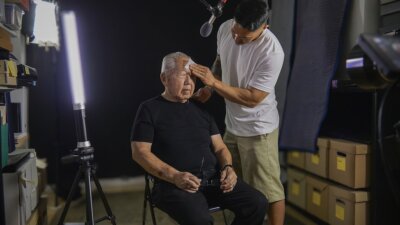
Courtesy of Sundance Institute | photo by Tadashi Nakamura.
“I think I’m taking it better than I thought I would”
“What did the neurologist say?”
“The, uh.. the neurologist, I think… is pretty sure I have Parkinson’s. I’m pretty sure I have Parkinson’s. I have so many of the symptoms.”
In Third Act, filmmaker Tadashi Nakamura depicts a poignant portrait of his father, Robert Nakamura. The film touches on many aspects of his father: his traumatizing past and long-concealed depression, kinship with art and community, work and legacy, familial relationships, and the present state of his life with Parkinson’s. While striving to create a film worthy of his father’s legacy, Tadashi is simultaneously working through his own feelings about the Parkinson’s diagnosis and the reality of his father’s looming mortality.
Known as the “godfather of Asian American media,” Robert A. Nakamura’s work had a far-reaching impact. He produced 28 films on the Japanese American experience, including Hito Hata: Raise the Banner – one of the first narrative feature films made by and about Asian Americans – and his 1971 film Manzanar – which was inducted into the Library of Congress’ National Film Registry. He taught film students at UCLA for 33 years, and established the school’s Center for EthnoCommunications, a community-based documentary program, and he founded Visual Communications, the first collective of Asian American filmmakers, which still exists today.
“This is the third act of your life, right?”
“Right.”
“Retirement. People treating you like you’re old.”
“I mean, ‘Third Act works.’ But it’s the third act, so what?”
This documentary was created after Robert had accomplished all these things, as he’s entered his so-called “Third Act” of life. But the film undulates between present and past, with Robert’s reflections accompanied by still images and video clips drawn from over the course of his entire life.
“Everything comes back to camp, and everything comes back to Manzanar”
Robert’s “first act” was marred by racialized trauma and shame. He grew up as a child amidst World War II, and when he was six, his family was forced into the concentration camp at Manzanar. “After Pearl Harbor, overnight, I was a Jap. I had the face of the enemy.”
Even after leaving the camp, there was no reprieve, as Robert and his family faced “unabashed racism” when they returned to L.A. While they were middle class prior to the camp, they returned with very little.
These forces combined led to young Robert developing deep feelings of embarrassment in his family. “I sometimes wish I had another father – I guess that’s another way to put it – that didn’t have the Japanese face, that didn’t have that accent, and poor English.” He was also embarrassed of their financial status, asking to be dropped off away from his house so his friends wouldn’t see where he lived, and trying to hide the fact that his father worked as a gardener.
“I think a lot of the drive as trying to belong, and that part I regret. And maybe that’s my first real depression, when I was fed up with everything and I really didn’t know what to do.”
These experiences also produced immense self-loathing: “All I could do was think of, ‘Why couldn’t I be someone else?’ And that’s the ultimate self-hatred, is wanting to be someone else.”
Despite achieving success as a commercial photographer, he “couldn’t relate to the content of it.” No matter how good his work was, how well he did for himself, “it still was obvious that I was a Jap, exotic, Oriental.”
Ultimately, his love of art and creativity was able to foster community and serve the broader Asian American movement, which ultimately served as a balm for these feelings, and ushered in his “second act.”
“We needed to document ourselves. The key was how do we use media to serve the people?”
When Robert was invited to photograph the first pilgrimage to Manzanar, he focused on photographing people’s faces. For him, it wasn’t a conscious decision, it was just “instinctive” and “automatic.” He unknowingly “was creating a visual idea of community,” documenting people who, to him, represented a hopeful future, “the new generation who was going to question a lot of things that happened to Japanese Americans.”
Catalyzed by this experience, he enrolled in UCLA’s film program where he made Manzanar, “one of the first films about the Japanese American concentration camps,” and later founded Visual Communications, an Asian American filmmaker collective dedicated to producing films that could contribute to the movement.
His participation in the movement impacted his life in other ways. Through his involvement, he met his wife, with whom he created many films, and started a family. It also changed his perception of his father, Jiichan. He reflects that, previously, he hadn’t viewed his father as a “full-fledged, dimension person.” In contrast with his prior embarrassment and shame, after becoming part of the movement, Robert was able to gain “more respect for him and some admiration.”
“The movement more or less solved all of my problems: my artistic problems, my identity problems, my sense of self-worth, sense of belonging. It gave meaning to my life.”
Through the first two acts of Robert’s life, viewers see how art, community, and mission-driven work all had healing impacts on his self-perception and overall life. They provided a reprieve from his inner turmoil, contextualized his thoughts and experiences of being a racialized person in the U.S. within a broader community, and provided an avenue through which he could make meaningful contributions to cause he deeply believed in. It’s clear why, as Tadashi explains, he “talks about the movement more than any other parts of his life.” Combined, these elements all helped to alleviate his self-loathing and depression.
However, as effective and impactful as these things were for him, nothing is a panacea. As is often the case, even finding fulfillment in work and a happy home life cannot safeguard from depression. The film also showcases how those challenging emotions resulting from the first two acts of his life nevertheless persist into the third.
“I am, by any measure, I’m in a really good place in terms of family, finances, creative work, friends, community. But regardless of that, every morning you wake up feeling miserable, the feeling in the pit of your stomach, and you don’t want to get out of bed.”
An early scene in the film depicts recent footage of a potluck meal taking place in a family home. While everyone else is crowded together in one room, eating and talking, viewers see Robert sitting with his plate of food, watching football alone in another room. He explains, “Yeah, right – right now, I just don’t feel up to socializing that much right now. I’m gonna – I’m gonna go upstairs.” Sitting on his bed, he expands, “Yeah. Yeah. Sometimes I can do it, and sometimes I can’t. Today is just not a very good day. I feel motivated, but I just can’t carry on a conversation right now.”
Tadashi, in voiceover, states, “My dad didn’t come out of his room for the rest of that day.” He also reflects back to his childhood, remembering “there were times when my dad would stay in bed for days.” Perhaps chalked up to youthful naiveite, he assumed just physical illness, never having an inkling that his father could have depression.
In conjunction with his depression, now Robert also grapples with his Parkinson’s, worsening condition, and looming mortality.
“Yeah, life is coming to an end. We all know it’s coming to an end, but… until you get something, you know, say you have Parkinson’s or, I’m sure, cancer or something like that, you don’t realize things can end.”
Like many people who deal with illness, Robert struggles with his reduced autonomy. He bemoans the loss of independence that accompanies both his Parkinson’s and depression. He expresses discomfort with how he must now depend on his wife as a full-time caregiver, and in his guilt about “putting everything on everyone.” While asserting that he doesn’t “have a fear of dying,” he expresses great concern about the decline itself, and that in actuality, the prospect of living in a nursing home is really what “scares the shit out of [him].”
He also laments how it coerces one into having to singularly think about oneself: “what you’re feeling, what you’re losing, et cetera. And I hate that.”
“You know, before, you’ve always had Dad in your back pocket. You know, this one, it puts both you and he, you know, in a totally different relationship. This is a way to say goodbye and to come to grips with your own fears.”
Alongside the struggles with identity, depression, and Parkinson’s, Third Act also tackles grief from a variety of angles.
For example, Tadashi has to come to terms with his anxiety at the prospect of this loss and his anxiety of “who I would be without my dad.”
Unsurprisingly, this apprehensiveness bleeds into capturing footage itself. Tadashi reflects that “it’s easier for me to just turn off the camera instead of dealing with what’s happening to my dad.” Tadashi continues, “I’m shooting all the time, and so I’m thinking about the film, and I’m stressing out, and I’m getting anxious.”
“Yeah, Mom was right. I really enjoyed having a son, enjoyed having you, and kind of added a piece to my life that became even more important than my career.”
Third Act also spotlights the intergenerational relationships between the Nakamura men. The creation of the film itself serves as a familial full circle moment. Throughout the movie, Tadashi in voice-over repeatedly declares, “I always knew I had to make a film about my dad.” When Robert was Tadashi’s age, he too made a film about his father, Jiichan.
For Robert, that film served as a slight offering, an attempt at offsetting the shame he felt towards his father as a child. He had planned on making a subsequent film about Jiichan, one that had “less history and more soul” than the first but never managed to. So, through this film, Tadashi is able to both do as his father did before him and expand upon it by accomplishing Robert’s unfulfilled goal. And just as Tadashi took comfort in being able to understand and remember Jiichan through his father’s film, this one will be able to fulfill the same role in his son’s life.
“Third Act” premiered at the 2025 Sundance Film Festival as part of the U.S. Documentary Competition. In addition to screening in both Park City and Salt Lake City, this film was available online. It will next screen at the 2025 Santa Barbara International Film Festival.






